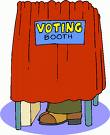New Orleans Today I got to vote in the Presidential primary. Expected turnout was projected at 15%. It will be interesting to see what develops.
Since I have shared my worries about the entire process around super-delegates and the confusion on counting current delegates, let me share more support for my worry beads.
Last night on the CNN loop I saw a hardy argument about the role of super delegates. The position argued by a columnist (whose name I missed unfortunately) was fascinating. He argued that super delegates should not be allowed to cast the deciding votes on a nomination, especially one as close as this, but instead they should cast votes to represent how the voters in their state had spoken. He indicated that Senator Barbara Boxer had pledged to do just that before the California primary, and now was therefore committed to Senator Clinton in the convention. To maintain some democratic voice he believed that is the way the chips should fall, particularly to prevent the wheeling and dealing or the impression that a nominee could be decided by super delegates outside of the election and caucus procedure. Senator Ted Kennedy might be a little uncomfortable given the way Massachusetts voted, but at least there is fairness that speaks to this plan.
The Times realized that they were part of the confusion and a huge outlier in this system and wrote a story today essentially about the mess they were part of and even used their own employee, Janet Edler, editor of the news surveys department, as the source for part of the article. In the piece by Mike McIntire he cited some of the same pieces I mentioned the other day: MSNBC’s nod to Obama particularly versus the huge lead the Times had given Clinton (whom they endorsed editorially) at 912-741. They focused all of the blame on the caucus process, even as they admitted that their own process was the opposite of transparent. The caucus problem was based on their decision to not count any caucus delegates (including Iowa!) until all of the various steps had been exhausted up to district and state conventions. The reasoning (from our experience) seems a little suspect, since the number of “switches” is usually moderately small. I would think that they could have easily counted the delegates with a 5 or 0% spread if they were so concerned, much as they report poll results with a margin of error and use them as guides rather than certainties. To simply not count them at all even after the early results are well known and settled seems deliberately obtuse.
Maybe there are some lessons the Democratic Party needs to learn from all of this? More accountability from super delegates would be an absolute achievement at the least, I would think.
